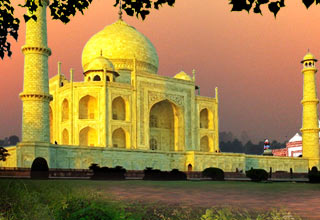 The
architecture of Taj Mahal is considered as the finest specimen of Mughal
style of architecture. The architecture of Taj Mahal is highly inspired
from different styles of architecture, which includes Persian, Indian
and Turkish. Considered as a world heritage monument and one of the
wonders of the world, Taj Mahal architecture is truly splendid and one
of its kind in the world. The design & layout of Taj Mahal never
fails to enrapture architects, engineers, historians as well as common
man.
The
architecture of Taj Mahal is considered as the finest specimen of Mughal
style of architecture. The architecture of Taj Mahal is highly inspired
from different styles of architecture, which includes Persian, Indian
and Turkish. Considered as a world heritage monument and one of the
wonders of the world, Taj Mahal architecture is truly splendid and one
of its kind in the world. The design & layout of Taj Mahal never
fails to enrapture architects, engineers, historians as well as common
man. The main object of focus of the Taj Mahal is the rounded dome. Its designing was done by Ismail Khan. The massive dome done in white marble is a truly marvelous piece of architecture. Its rounded shape has earned it the name of an onion dome or a guava dome. There is a lotus design carved at the top of the dome, which adds to its height. One can see a unique blend of Hindu as well as Persian architecture in the design of the dome.
On the top of the dome, one can see a bronze spire. It was supposed to be made of solid gold until it was plundered after the Mughal rule declined in the 19th Century. Again, one can see a blend of Persian and Hindu design on the finial. The finial is topped by a crescent shaped moon whose horns point towards the heavens above. Since it is place on a vertical spear like structure, it reminds one of the symbol of Lord Shiva.
The base of the Taj Mahal has four minarets in each corner. Each of these minarets reach upto a staggering height of 40 meters. The minarets are brilliantly designed, as they are an essential part of any Muslim structure. Each minaret is built in such a way that it slants a bit towards the outer edge of the whole construction. This was done so as to prevent any kind of damage to the monument in case of an earthquake. The minarets are beautifully carved with intricate designs and had semi precious gems studded at one point of time.










